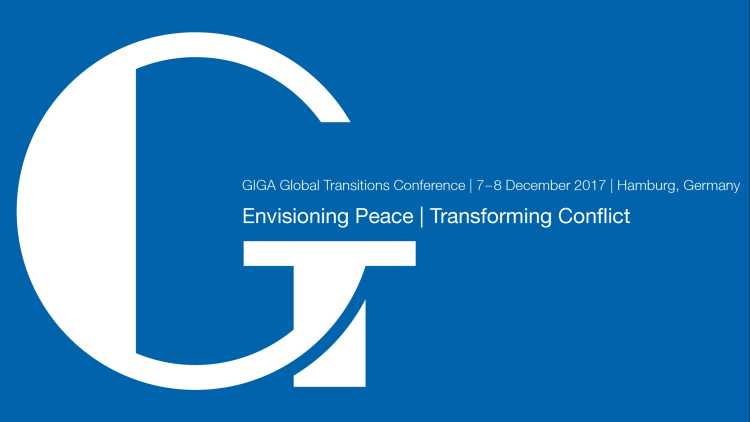- Startseite
- Forschung & Transfer
- Forschungsprojekte
- Envisioning Peace | Transforming Conflict
Envisioning Peace | Transforming Conflict
Peace and conflict transformation are core topics in the social sciences and humanities. At the same time, theories, methods and data are shaped to an overwhelming degree by the experience of Western industrial democracies or the ‘objects’ of their intervention. This project provides a change in perspective by including the multifaceted experiences of the Global South and applying a global approach to peace.
GIGA, LSE, CCDP, University of Marburg, 2016-2019
Team
Leitung
Forschungsfragen
- What can we learn from Latin American experiences for a global approach to peace and peace-building?
- Is there a peace approach to Latin American violence(s)?
Beitrag zu internationaler Forschung
Peace and conflict transformation are core topics in the social sciences and humanities. At the same time, theories, methods and data are shaped to an overwhelming degree by the experience of Western industrial democracies or the ‘objects’ of their intervention. If and when Global South experiences are addressed, then mostly with a “deficit approach”, taking Western experiences of state formation, democratisation and economic development as an analytical and practical blueprint. The project seeks to change the perspective towards envisioning peace and to the multifaceted experiences of the Global South. It aims at extending the territories of theory-building in peace and conflict research beyond European/North American borders. In a first step Latin American experiences stand at the core.The peace accords in Central America in the 1990s and between the Colombian government and the FARC in Colombia in 2016 raised hopes that a long cycle of intrastate war and armed violence had come to an end. Latin American postwar societies were pioneers of liberal peacebuilding. Nevertheless, Latin America remains one of the most violent regions in the world if we include other manifestations of violence such as homicides, organized crime and gangs. Latin American experiences are rather investigated under a public security perspective and do not figure prominently in the international debates on peace and peace-building.
Forschungsdesign und Methoden
A first step is the development of a concept of peace that goes beyond minimalist notions of peace as the absence of war. The analysis of violence(s) includes the underlying conflict, relevant actors a(such as elites and youth) as well as violence reducing strategies in different spaces (e.g. urban or rural). The international network brings together different perspectives and experiences from different disciplines (political sciences, sociology) to contribute to a global approach to peace.
Vorläufige Ergebnisse
Conceptualizing peace as violence reduction provides empirical evidence for high levels of variation in time and space. Debates at the GIGA Global Transitions Conference 2017 helped to clarify concepts and definitions of peace to avoid its use as an empty signifier as well as to operationalize indicators for comparative research. At the same time across time and space conditions promoting peace may such as trust and the rule of law may vary in their importance. A systematic inclusion of Latin American experiences took place at two conferences in Bogotá 2017 and 2018, providing interesting insights into different contexts and experiences regarding the search for peace in highly violent contexts.










